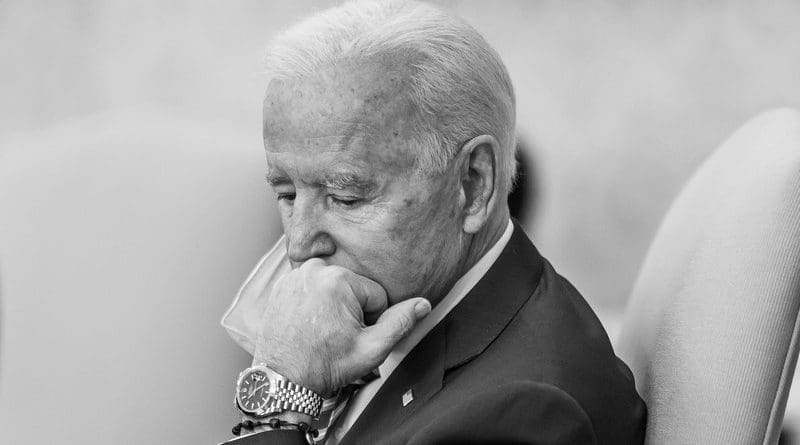Biden’s Brief Window To Fix The World’s Broken Institutions – Analysis
By Adam Triggs*
Former US president Donald Trump was right about one thing: many of the world’s international institutions are flawed. His arguments as to why were usually wrong, often veiled attempts to find a scapegoat for his own domestic woes. His response to those institutional flaws was worse. Like the kid who takes their ball and goes home, Trump’s approach was to run away, not pursue reform.
Instead of working to fix flaws in the World Trade Organization (WTO), the World Health Organization (WHO), the International Monetary Fund (IMF) and other institutions, Trump either ignored the problem, attacked the institution or withdrew from the institution altogether. He recklessly surrendered one of the most powerful weapons in the US arsenal: the ability to lead in writing global rules and shape global institutions.
Re-writing global rules and reforming the world’s institutions isn’t easy. Past reforms have been painstakingly difficult. Historically, successful reforms have required at least three things: leadership from the President of the United States, approval from the US Congress (at least when funding is required) and a quorum of major countries that support the change. For the first time in more than a decade, all three pieces of the puzzle could be in place.
The Democrats’ dual January Senate wins in Georgia mean they now control both houses of Congress and the White House. President Joe Biden understands that much of US power has come from the institutions and rules it created to cement US interests and influence. Want to trade or invest internationally? You’ll need US dollars for that. Want to access the global payments system? Then don’t upset the United States. Need an IMF bailout or a World Bank loan? Only the United States has veto power.
But these institutions have not aged well and US influence has suffered as a result. Past reforms have helped but more is required. The WTO is a relic of the past. The global trading rules need to be updated to cover subsidies, state-owned enterprises, forced technology transfer and the digital economy. These issues have fuelled tensions and trade wars.
The IMF is little better. Its quota formula — which gives too many votes and funding responsibilities to Europe and too little to Asia — should be updated to reflect the modern economy, along with its Executive Board. Without reform, the IMF’s legitimacy and funding suffers; forcing it to be a minority lender in major bailouts while relying on temporary loans (which progressively expire from 2023 to 2025) for half its funding.
The WHO’s budget is smaller than the budget of most big hospitals. The share of unearmarked funding is low, with membership dues representing less than 20 per cent of the agency’s total budget. The WHO’s mandate is too broad and its governance structure is too narrow — excluding voices from civil society — while its technical expertise is too limited in areas ancillary but critical to effective health responses: logistics, urban design, economics, law and information technology.
Many more global institutions need reform. Like the IMF, the World Bank’s governance needs to reflect the global reality. The out-of-date-membership of the International Energy Agency means that the body which is meant to represent energy consuming countries now excludes a majority of the world’s energy consumers.
The consequences of these out-of-date institutions are the same: more fragmentation and less US influence. As the funding, legitimacy and effectiveness of these institutions dwindle, regional competitors emerge. For the WTO, it’s a plethora of plurilateral and bilateral trade agreements. For the IMF, it’s the European Stability Mechanism, the Chiang Mai Initiative and hundreds of bilateral currency swap lines. For the World Bank, it’s the Asian Development Bank, the Asian Infrastructure Investment Bank and bilateral agencies among others.
Fragmentation makes the global system less effective. Most global, regional and bilateral trade agreements are incompatible with each other and create a nightmare for businesses to navigate. Responses to financial crises are now slower, more cumbersome and more political. Responses to health crises, development challenges and energy transitions are less effective and less coordinated.
As US-dominated institutions fade into the background, so does US influence. But for the first time in more than 10 years, Biden has a window of opportunity to fix this. Holding the White House and both houses of Congress, the United States can lead reform in these institutions and create new rules where there are none today: from tax, trade and climate change to competition policy, data and the digital economy.
Countries overwhelmingly support change, especially in Asia. Indonesia will host the G20 next year and has been a stalwart leader on the case for WTO reform. Asia’s bitter memories of the IMF’s past failings have seen them spend decades calling for reform. A region desperate for investment will benefit substantially from reformed and better coordinated development banks while climate change is an opportunity for constructive engagement on a common priority between the United States, China and the Asian region.
Indonesia’s G20 host year in 2022 is an opportunity to get this done. If history is anything to go by, Biden will lose the House of Representatives, the Senate or both in the November 2022 US mid-term elections. He has no time to wait.
*About the author: Adam Triggs is Fellow and Director of Research at the Asian Bureau of Economic Research (ABER), Crawford School of Public Policy, Australian National University, and non-resident Fellow in the Global Economy and Development Program at the Brookings Institution.
Source: This article was published by East Asia Forum


Why should the USA be the country which will write the rules of the game? witnessing the functioning of american democracy and american capitalism China and Europe should push back.